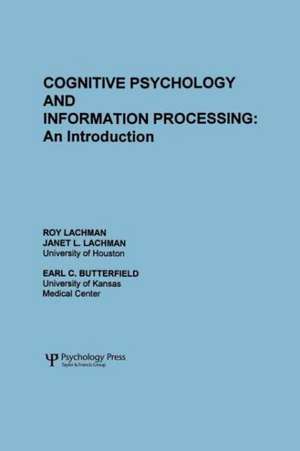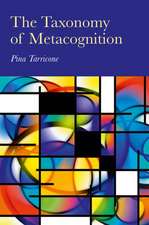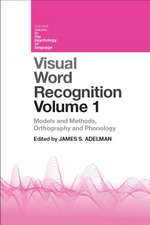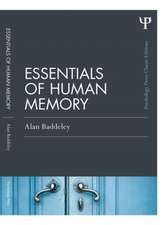Cognitive Psychology and Information Processing: An Introduction
Autor R. Lachman, J. L. Lachman, E. C. Butterfielden Limba Engleză Paperback – 1979
Preț: 1283.60 lei
Preț vechi: 1565.37 lei
-18% Nou
Puncte Express: 1925
Preț estimativ în valută:
245.62€ • 253.39$ • 204.97£
245.62€ • 253.39$ • 204.97£
Carte tipărită la comandă
Livrare economică 26 martie-09 aprilie
Preluare comenzi: 021 569.72.76
Specificații
ISBN-13: 9780898591316
ISBN-10: 0898591317
Pagini: 592
Dimensiuni: 152 x 229 x 30 mm
Greutate: 0.77 kg
Ediția:1
Editura: Taylor & Francis
Colecția Psychology Press
Locul publicării:Oxford, United Kingdom
ISBN-10: 0898591317
Pagini: 592
Dimensiuni: 152 x 229 x 30 mm
Greutate: 0.77 kg
Ediția:1
Editura: Taylor & Francis
Colecția Psychology Press
Locul publicării:Oxford, United Kingdom
Public țintă
ProfessionalCuprins
1. SCIENCE AND PARADIGMS:THE PREMISES OF THIS BOOK 2. PSYCHOLOGY'S CONTRIBUTION TO THE INFORMATION-PROCESSING PARADIGM 3. CONTRIBUTIONS OF OTHER DISCIPLINES TO INFORMATION-PROCESSING PSYCHOLOGY 4. THE INFORMATION-PROCESSING PARADIGM 5. REACTION TIME: THE MEASURE OF AN EMERGING PARADIGM 6. CONSCIOUSNESS AND ATTENTION 7. SOME STRUCTURAL FEATURES OF HUMAN MEMORY: THE EPISODIC MEMORY SYSTEM AND ITS PARTS 8. FLEXIBILITY IN THE EPISODIC MEMORY SYSTEM: NEW DIRECTIONS FOR MUL TISTORE MODELS 9. SEMANTIC MEMORY 10. PSYCHOLINGUISTICS 11. COMPREHENSION FROM THE PSYCHOLINGUISTIC VIEWPOINT 12. DISCOURSE PROCESSING AND GLOBAL MODELS OF COMPREHENSION 13. PATTERN RECOGNITION 14. EPILOGUE: CRITIQUES OF THE PARADIGM
Notă biografică
Roy Lachman and Janet L. Lachman University of Houston, Earl. C.Butterfield University of Kansas Medical Center















